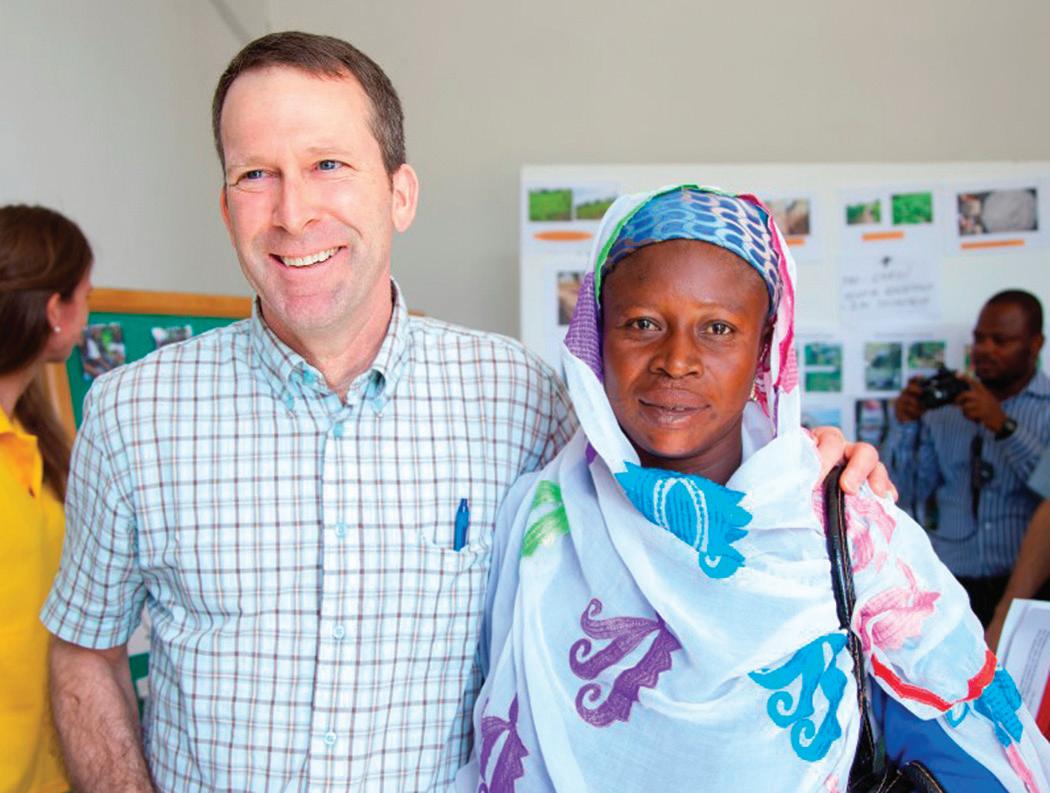
5 minute read
Reviews
News
Schools break new ground with “collaborative MBA”
Business and organizational personnel who want to develop their leadership skills, enhance productivity and increase profits while contributing to the “common good” now have the chance to enroll in a novel new MBA program.
Three Mennonite institutions — Bluffton University in Ohio, Eastern Mennonite University in Virginia, and Goshen College in Indiana — have joined forces to launch “The Collaborative MBA” to shape “transformative leaders.”
“We’re interested in developing authentic leaders who understand that personal, business, organizational, and community existence and success are tied to the sustainability of local and global systems,” says George Lehman, director of graduate programs in business at Bluffton.
The 36-hour program will focus on “skills in entrepreneurship, shared vision development, mutual accountability, financial integrity, continuous innovation, empowerment of people and teams, and systems thinking,” says Michelle Horning, chair of Goshen’s business department.
Program director is Jim Smucker, graduate dean at Eastern Mennonite University and formerly president of the Bird-in-Hand Corporation and board chair of the Lancaster (Pa.) Chamber of Commerce. For him, a unique aspect is to address leaders’ needs for personal and spiritual growth. Most other MBA programs focus mainly on topics like budgeting, strategic planning and marketing, he says.
The Collaborative MBA will cover these topics too, says Smucker. In addition, however, “our program will have an explicit orientation toward the well-being of people, community and planet. We will situate making profits within the context of ethical practices and contribution to the common good.”
Collaborative MBA students can choose from eight concentrations: leadership; health care administration; finance; leading non-profits; conflict transformation; sustainability; intercultural leadership and self-designed.
The program calls for a week of residential courses at one of the three sponsoring schools and a week of residency in an international setting. It also features distance learners joining students and professors via interactive video conferencing, as well as students pursuing projects and interacting with professors on a mutually convenient schedule.
While it is expected that there will be a broad range of students from a variety of backgrounds, a key target student is someone holding a full-time job in a small-to medium-sized business or organization, perhaps with family responsibilities, who needs
Did missionaries help make a dent in poverty?
It’s no secret that democracy and good governance can give a country a leg up to reduce poverty. Could it be that the Christian missionary enterprise played a role in spreading these values, thus helping to create a climate where democracy — and, by extension, development — could flourish?
Missionaries are often blamed for looking the other way when colonialist behavior kept nations in chains, but a sociologist/political science scholar is trying to prove the opposite – that evangelical missions actually bolstered the health of nations.
Robert Woodberry’s efforts to create a statistical model to examine the link between missionary work and civil health is featured in the January/ February 2014 issue of Christianity Today (“The World the Missionaries Made” by Andrea Palpant Dilley).
Woodberry, who has taught at the University of Texas and is now at National University of Singapore, has for years explored how missionary work helped fuel the rise of liberal democracy. He found it was not easy to go against received secular wisdom that missions were a drag on local cultures, but the more he probed the more convinced he became that there must be a reason why some countries developed stable democracies and flourished while their neighbors suffered dictators and conflict.
“Areas where Protestant missionaries had a significant presence in the past,” Woodberry says in the article, “are on average more economically developed today, with comparatively better health, lower infant mortality, lower corruption, greater literacy, higher educational attainment (especially for women), and more robust membership in nongovernmental associations.”
His research found that evangelical missionaries generto be able to pursue graduate studies in a flexible manner, says Horning.
The curriculum is based on the concept of “leadership for the common good” which includes values of spirituality, community, leading as service, justice, sustainability and global citizenship.
“In keeping with our Anabaptist-Christian roots,” says Lehman, “all of us involved in this program have a holistic view on how all of our decisions and actions affect other people, the community, and the world.” — Bonnie Price Lofton
ally did not support colonial abuses, as is sometimes charged, but in fact raised an outcry against them. “One stereotype about missions is that they were closely connected to colonialism,” he says. “But Protestant missionaries not funded by the state were regularly very critical of colonialism.”
How did missionaries, intentionally or otherwise, lay a base for democracy? One way was to focus on literacy and education. Woodberry claims it is no accident that wherever evangelical missions thrived they left more book-printing capacity and more schools per capita. British missionaries in particular established schools and printing presses that raised the level of education and thus laid a foundation for civil society. At play was evangelical Protestant belief in the priesthood of all believers, which held that if everyone is equal before God and has direct access to God, they need to be able to read God’s Word in their own language.
One missions expert quoted in the article asserts that “literacy is the main thing that helps you rise out of poverty. Unless you have broad-based literacy, you can’t have democratic movements.” ◆
Canadian dignitaries visit soybean project
Last year ended on a high note for MEDA client Baala Ajara as she was selected “best soybean farmer” in her local district of Ghana. The honors kept coming in February as Ajara, 37, was invited to tell her story to a delegation from the government of Canada, which sponsors the MEDA project of which she is a part.
Among the visitors were Paul Rochon, Canada’s deputy minister for international cooperation, Christopher Thornley, Canadian ambassador to Ghana, and Kenneth Neufeld, regional director of Canada’s Department of Foreign Affairs, Trade and Development (DFATD), successor to the Canadian International Development Agency (CIDA).
Members of MEDA’s GROW project (Greater Rural Opportunities for Women) told how the new venture helped 4,000 women farmers last year (with ultimate target 20,000) boost income and family nutrition and improve marginal soil by growing soybeans. Seventeen other agencies also provided a look at how development projects were affecting government and farmers at the local level.
Catherine Sobrevega, MEDA’s country project manager, highlighted market links strategies and key successes and challenges from the first year. She reported later that many attendees approached her afterwards to say they were impressed by MEDA’s business approach.
When the delegation visited Baala Ajara, the awardwinning farmer commented, “If you work hard, this is what you’ll get. It’s very motivating for me to continue.”
For his part, deputy minister Rochon told the group that “We love this country, and we’re going to stay in this country.” ◆
Award-winning client Baala Ajara, right, with Paul Rochon, Canada’s deputy minister for international cooperation.


